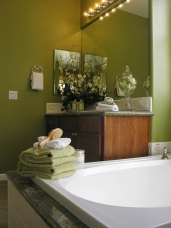Földgáz - A környezetkímélő energia forrása

Taking warm showers, hot baths

The production of hot water consumes most energy besides heating: it amounts to nearly 10-15 percent of a household's total energy needs.
Between 30 and 50 litres of hot water is used in a household per person every day. More than half of this is used up for taking a bath. Another quarter is used up in the kitchen and for cleaning, while the remaining quarter is used up at the washbasin. As a result of this, with a well-planned hot water supply we can save a significant amount of energy and money at the same time.
Overview of hot water systems
One for everyone
Regarding hot water systems we distinguish between centralized and decentralized water heating (see the next section). The central supply, which is in a connection with the heating system of the building, is primarily used in detached houses. A heater boiler provides the heat for the living space and simultaneously warms up the water as well. The central hot water storage heater is also comfortable, since it supplies the whole house with a large amount of hot water – without lengthy waiting times. In the event solar collectors or hot pumps are applied the central hot water supply is necessary, anyway.
Water heaters (boilers)
The electric water heaters are comfortable and even 20 percent more economical than the hydraulic apparatuses, since the water temperature can accurately be adjusted in accordance with the desired temperature. On the other hand, the thermal and hydraulic water heaters do not work so precisely. The rarely-used taps, for example in the guest bathroom, can be supplied most economically by means of small electric boilers.
Natural Gas
The heating apparatus used for heating and hot water production are especially economical. The modern gas water heaters operate on the principle of the boilers or water storage heaters.